Ionic equation - Study guides, Class notes & Summaries
Looking for the best study guides, study notes and summaries about Ionic equation? On this page you'll find 1038 study documents about Ionic equation.
Page 4 out of 1.038 results
Sort by
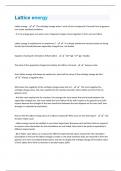
-
Lattice energy Questions And Answers | 100% Correct Answers | 2024 Updated Quiz
- Exam (elaborations) • 6 pages • 2024
-
- $7.99
- + learn more
Lattice energy - - The enthalpy change when 1 mole of ionic compound is formed from its gaseous ions under standard conditions - It is the energy given out when ions of opposite charges comes together to form an ionic lattice Lattice energy is endothermic or exothermic? - - It is always exothermic because bonds are being formed (ionic bond) between oppositely charged ions, not broken Equation showing the formation of NaCl lattice - - Na^+(g) + Cl^-(g) > NaCl(s) The state of the opposite...
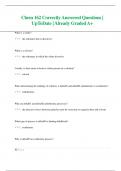
-
Chem 162 Correctly Answered Questions| UpToDate | Already Graded A+
- Exam (elaborations) • 11 pages • 2024
- Available in package deal
-
- $10.49
- + learn more
What is a solute? : the substance that is dissolved What is a solvent? : the substance in which the solute dissolves Usually, is there more solvent or solute present in a solution? : solvent When determining the enthalpy of solution, is deltaH1 and deltaH2 endothermic or exothermic? : endothermic Why are deltaH1 and deltaH2 endothermic processes? : the attractive forces between particles must be overcome to expand solute and solvent What type of process is deltaH3 in finding deltaHsoln...
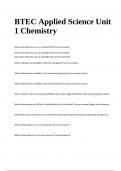
-
BTEC Applied Science Unit 1 Chemistry - Distinction.
- Exam (elaborations) • 31 pages • 2024
-
- $13.49
- + learn more
BTEC Applied Science Unit 1 Chemistry - Distinction. How many electrons can an s subshell hold? correct answer2 How many electrons can a p subshell hold? correct answer6 How many electrons can a d subshell hold? correct answer10 Which subshells are available in the first energy level? correct answers Which subshells are available in the second energy level? correct answers and p Which subshells are available in the third energy level? correct answers, p and d What is Hund's rule? correct ...
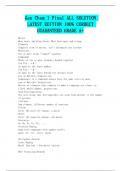
-
Gen Chem 1 Final ALL SOLUTION LATEST EDITION 100% CORRECT GUARANTEED GRADE A+
- Exam (elaborations) • 10 pages • 2024
-
- $12.99
- + learn more
Matter Most basic building block. Must have mass and volume Elements Simplest form of matter, can't decompose any further Molecules Two or more atoms "linked" together Compounds Mixes of two or more elements bonded together Sig Fig.- x & / As many as the least number Sig Fig.- + & - As many as the least behind the decimal point Law of Definite Composition Components in a compound always have the same ratio by mass Law of Multiple Proportions Ratios of elements that combine to m...

-
Inorganic Chemistry Exam 3 With 100% Correct Answers 2024
- Exam (elaborations) • 12 pages • 2024
- Available in package deal
-
- $11.49
- + learn more
Inorganic Chemistry Exam 3 With 100% Correct Answers 2024 What is electronegativity? - answerhow hard an element pulls on electrons in a bond electronegativity is related to? - answerdipole moments, ionization energy, electron affinity, Zeff, and radii what are the four different types of bonds? - answerionic, covalent, polar covalent, and metallic covalent what is the Mulliken equation? - answerX=EA+IE/2 what is the Mulliken equation used for? - answerto calculate electronegativity from...
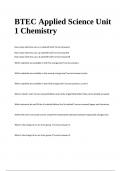
-
BTEC Applied Science Unit 1 Chemistry - Distinction.
- Exam (elaborations) • 31 pages • 2024
-
- $13.99
- + learn more
BTEC Applied Science Unit 1 Chemistry - Distinction. How many electrons can an s subshell hold? correct answer2 How many electrons can a p subshell hold? correct answer6 How many electrons can a d subshell hold? correct answer10 Which subshells are available in the first energy level? correct answers Which subshells are available in the second energy level? correct answers and p Which subshells are available in the third energy level? correct answers, p and d What is Hund's rule? correct ...
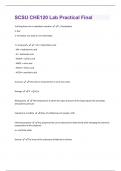
-
SCSU CHE120 Lab Practical Final Questions And Answers Rated A+
- Exam (elaborations) • 6 pages • 2024
- Available in package deal
-
- $7.99
- + learn more
3 driving forces for a metathesis reaction 1. Precipitation 2. Gas 3. Formation of a weak or non-electrolyte 7 s trong acids - HCl = hydrochloric acid - HBr = hydrobromic acid - HI = hydroiodic acid - H2SO4 = sulfuric acid - HNO3 = nitric acid - HClO3 = chloric acid - HClO4 = perchloric acid Accuracy How close a measurement is to its true value Average X ̅ = (∑Xi )/n Boiling point The temperature at which the vapor pressure of the liquid equals the prevailing atmospheric pressure...
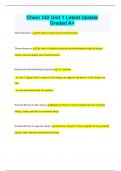
-
Chem 142 Unit 1 Latest Update Graded A+
- Exam (elaborations) • 19 pages • 2024
- Available in package deal
-
- $9.99
- + learn more
Chem 142 Unit 1 Latest Update Graded A+ Thermodynamics The study of energy and its transformation Thermochemistry The study of chemical reactions and transformations and the energy changes that accompany these transformations Electrostatic Potential Energy Equation - k = constant - Q = the 2 charges (Eel is negative if the charges are opposite and positive if the charges are like) - d = distance between the two particles Potential Energy for like charges Repulsion; Positive;...
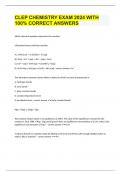
-
CLEP CHEMISTRY EXAM 2024 WITH 100% CORRECT ANSWERS
- Exam (elaborations) • 11 pages • 2024
-
- $16.49
- + learn more
Which chemical equation represents this reaction: a Bronsted-Lowry acid-base reaction A.) 2 KCLO₂(s) → 2 KCLO(s) + 3 O₂(g) B.) Zn(s) + Cu² + (aq) → Zn² + (aq) + Cu(s) C.) CO³ + (aq) + 6 NH (aq) → [Co(NH³)₆³+](aq) D.) H₂O+9aq) + NH₂(aq)→ H₂O(I) + NH₂+(aq) - correct answer The attractions between atoms within a molecule of NH3 are best characterized as A. hydrogen bonds B. ionic bonds C. polar covalent bonds D. London (dispersion) forces E. ion-dipole f...
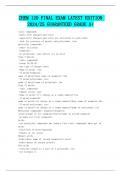
-
CHEM 120 FINAL EXAM LATEST EDITION 2024/25 GUARANTEED GRADE A+
- Exam (elaborations) • 5 pages • 2024
-
- $8.89
- + learn more
ionic compounds -deals with charged particles -oppositely charged particles are attracted to each other -look for presence of metals and polyatomic ions molecular compounds -share electrons -nonmetals -no polyatomic ions unless its an acid Type I metals -ionic compounds -group 1A,2A,3A -one type of charge state -Name of metal +ion -if metal+nonmetal: name of metal+base name of nonmetal +ide -if metal+polyatomic ion: name of metal+name of polyatomic ion Type II metals -ionic com...

$6.50 for your textbook summary multiplied by 100 fellow students... Do the math: that's a lot of money! Don't be a thief of your own wallet and start uploading yours now. Discover all about earning on Stuvia


